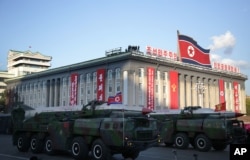Japanese leaders, while calling for a united front with the United States and South Korea ahead of proposed U.S.-North Korea nuclear talks, are seeking to thrust issues of their own onto the agenda.
Foremost among these is Tokyo's longstanding demand that North Korea release a number of Japanese nationals who were abducted decades ago. Japanese analysts also worry that U.S. President Donald Trump might accept a deal that removes the long-range missile threat to the United States but leaves Pyongyang with shorter-range missiles that can strike Japan.
At a National Defense Academy graduation event on Sunday, Japan’s Prime Minister Shinzo Abe said “a unified front from the international community for North Korea to abandon nuclear and missile development is important, and for that we will put the utmost pressure on North Korea until they take concrete actions.”
Abe is expected to dive into “deep discussions” on how the U.S. and Japan can coordinate their actions on North Korea when he meets with Trump in mid-April, said Yoshide Suga, chief cabinet secretary to the Abe administration, at a news conference on Monday. Trump has offered to meet North Korean leader Kim Jong Un before the end of May.
Taro Kono, Japan’s foreign minister, has been asking key officials in the U.S. and South Korea to not only discuss the nuclear and missile threat, but also the return of abductees held in North Korea.
The Japanese government has made little progress in years of negotiating with North Korea for the return of more than a dozen Japanese citizens who were kidnapped by North Korean agents during the 1970s and 1980s.
Tokyo stresses coordination
Kono said at a news conference in Washington on Saturday that he and South Korean Foreign Minister Kang Kyung-wha agreed “to work closely to find a solution to the abductee issue.”
Kono met last week with U.S. Vice President Mike Pence, Secretary of Defense Jim Mattis and other Trump administration officials. He asked for continued U.S. support on the abductee issue and stressed the need for coordination among the United States, Japan and South Korea on North Korea's nuclear and missile threat.
U.S.-Japan experts say Japanese officials may be worried that the U.S.-North Korea summit will result in restrictions on North Korea's intercontinental ballistic missile (ICBM) capability, which threatens the U.S. mainland, while ignoring short- and mid-range missiles that could reach Japan.
“North Korea may propose a deal to the U.S. to lift sanctions in return for it abandoning ICBM development and that would be the worst-case scenario for Japan,” said Yoichi Shimada, international politics professor at Fukui Prefectural University, in a phone interview.
Continued 'maximum pressure' urged
Shimada said that would leave the abductee issue unresolved while North Korea's mid-range Nodong missile, which could reach Japan, would still be in development.
“That’s why Abe keeps on pressing for maximum pressure on North Korea until they completely abandon all nuclear development,” said Shimada.
Hajime Izumi, professor of international relations at Tokyo International University, is also worried that Trump may focus on Pyongyang's ICBM capability when he meets Kim Jong Un. He noted that Trump has been pledging to his supporters that he will stop North Korea from attacking U.S. soil.
Izumi argued that Japan should hold its own bilateral talks with North Korea to make sure Kim Jong Un stops developing the Nodong missile.
In any event, Japanese analysts are not optimistic about the proposed Trump-Kim meeting, which still has not been confirmed by the North Korean side.
“Denuclearization talks between the U.S. and North Korea will most likely fail,” said Tsutomu Nishioka, visiting professor of area studies for the Korean peninsula at Reitaku University in Chiba.
Based on the track record and information coming out of North Korea, chances are very low so far that denuclearization will actually happen, said Nishioka.
Kim Jong Un may say “we’ll denuclearize” but the stronger indication is he will not act on that promise, he said.





